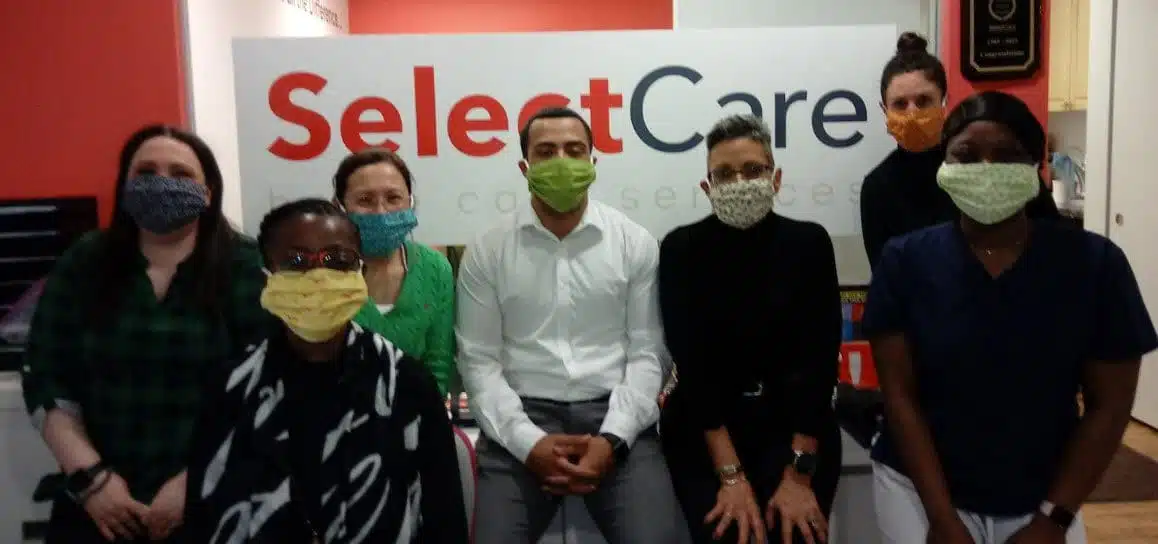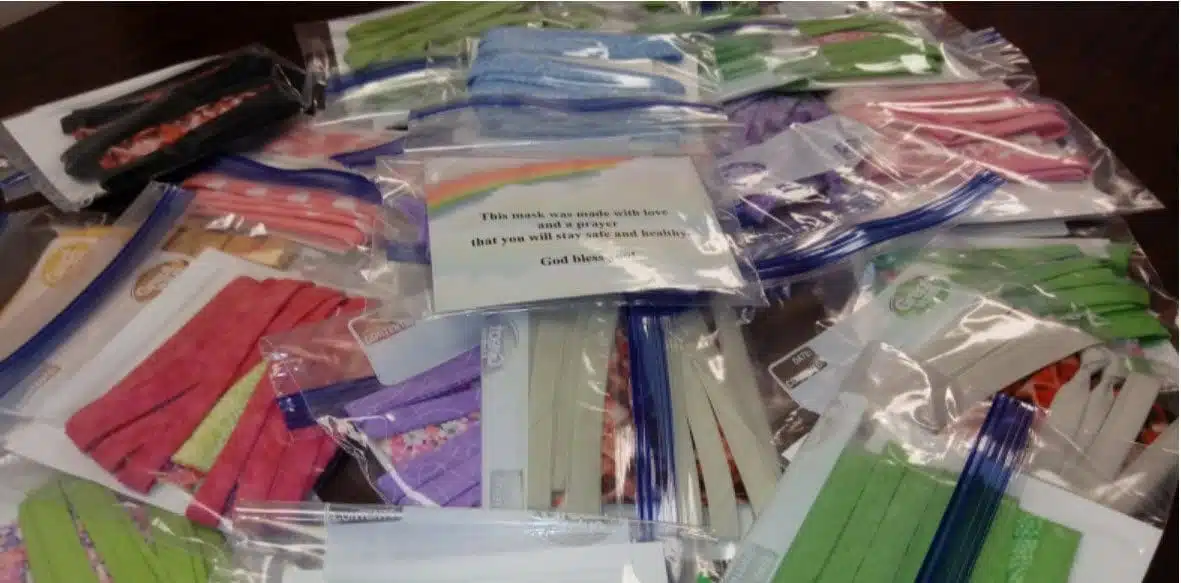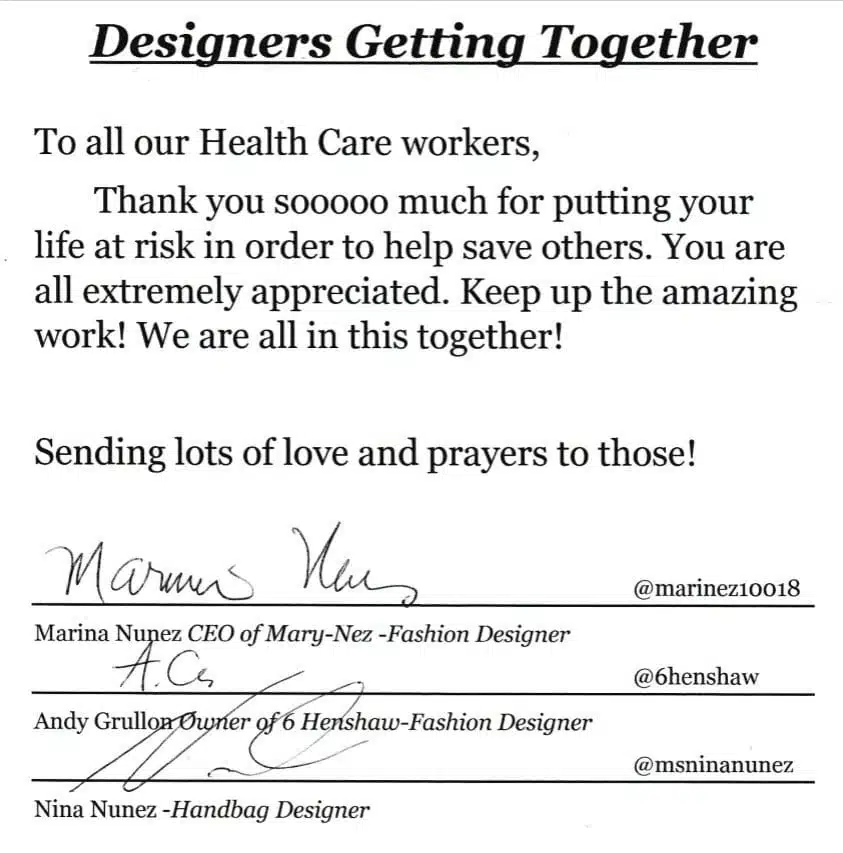Finding Personal Protective Equipment – Challenges and Successes
Posted in Finding Personal Protective Equipment (PPE)
SelectCare staff saw their first glimpse of the challenges ahead on January 31st in the form of a seemingly innocent email. The agency’s regular supplier of N95 and isolation masks was already experiencing stock shortages and the shipment would be delayed by two weeks.
The news was inconvenient, but the agency always maintained several weeks’ worth of supplies to ensure continuity of care in the event of a short to moderate disruption of deliveries – providing patient care during previous emergencies like September 11th, the 2005 blackout and Hurricane Sandy had demonstrated the value of advanced emergency preparedness planning time and again.
For most of America at this time, COVID-19 was a news headline and little more, but for health care providers, the race to marshal resources had begun. While city, state and federal agencies initially stated that Personal Protective Equipment (PPE) should exclusively be worn by hospital staff and those potentially ill, this guideline first changed into a recommendation that anyone outside wear a mask and ultimately evolved into the new normal: anyone unable to practice social distancing would be required to wear a face covering.
Private home health care agencies like SelectCare found themselves in a difficult position: ethically, medically and legally compelled to provide caregivers and clients with proper PPE, but ineligible for fast-tracked medical supply programs focused on Medicare/Medicaid agencies and obligated to source PPE through the same open market flooded by a panicking general public and large buyers like hospitals and state governments.

With PPE becoming more difficult to find and prices inflating to unsustainable levels due to demand, SelectCare’s staff needed to develop a new strategy to overcome these challenges.
Determining Need
To develop a PPE procurement strategy, SelectCare first needed to determine its “burn rate,” or the amount of supplies used by all SelectCare staff and clients over the course of a week.
Several factors helped reduce SelectCare’s burn rate: first, clients with lighter medical/service needs worked with staff to reduce their care schedules, freeing resources so the agency could continue to safely serve those most dependent on their home caregivers. Second, new guidelines to prevent cross-contamination from one client to the next meant caregivers could only work with a single client, reducing the need for multiple sets of PPE for each caregiver while lowering the risk for caregivers themselves to fall ill by limiting their exposure.
These changes reduced SelectCare’s patient load by nearly a third, lowered staffing levels by 25 percent and brought the agency’s PPE burn rate from about 600 pieces a week down to 350 while preserving the safety of caregivers and clients alike.
Despite these reductions, SelectCare’s staff still needed new PPE purchasing strategies to ensure they could keep up with demand.
A Team Effort
By early February, the local market for PPE had become a feeding ground for unscrupulous suppliers. Isolation masks, previously sold in boxes of 50 at roughly .25 cents per mask, were now being sold for anywhere between four and eight times their previous rate. SelectCare inboxes were flooded with questionable, typo-heavy offers from unknown suppliers claiming to have access to thousands of masks, nearly all of which were revealed as scams under basic scrutiny. Even local suppliers with long-time connections to the agency were forced to ration their inventory, selling no more than 150 masks per week.
Facing these shortfalls, various SelectCare staff members pursued unconventional routes to source supplies. 
Carla Holub, SelectCare Vice President, reached out to her cousin, Sister Luke Boiarski, a nun with the Nazareth,
Kentucky-based Sisters of Charity. Just a few days later, SelectCare received a package from Maine containing 40 reusable cloth masks through one of Sister Luke’s longtime pen pals and fellow sewing enthusiast, Dawn Delaney, followed shortly by a second package of 20 from Maine, as well as 25 masks sewn by the Sisters of Charity.
This supply of reusable masks was further bolstered by Accounting Assistant Maritza Roman, who through a friend in the Garment District, contacted a consortium of New York fashion designers who produced an additional 80 reusable masks in catwalk-approved black for SelectCare staff.

These reusable masks were distributed to home caregivers for their commutes to and from a client’s home, greatly reducing the PPE burn rate and ensuring continuity of care for dozens of New York seniors and peace of mind for caregivers facing increasingly unpredictable train service.
While reusable masks have made a major difference in getting caregivers safely around the city, actual patient care still requires medical-quality PPE. Fortunately, SelectCare’s staff has found some unorthodox ways to source these critical supplies.
Even some of SelectCare’s clients came forward to donate supplies, including dozens of difficult-to-find N95 masks that immediately went into service in the homes of the agency’s most vulnerable clients.
Between patient visits and calls to caregivers, SelectCare Field Nurse Supervisor Mi Miao would open WeChat, a popular Chinese-language social media app, and search the social network for local medical suppliers. This lengthy search revealed several reputable businesses across the city functionally invisible to much of SelectCare’s staff that ultimately added thousands of masks to SelectCare’s supply.
The final steps to secure long-term PPE stocks began with a simple call to the Better Business Bureau’s New York office. Frustrated with the ballooning prices of PPE from local suppliers, Carla Holub asked the Better Business Bureau to help her find medical supplies in as-yet unaffected parts of the country, netting a list of 10 medical supply companies eager to send supplies to the then front line of the fight against COVID-19.
Looking Forward
Despite extensive emergency preparedness planning, SelectCare’s successes have been hard won throughout the COVID-19 epidemic due to the massive demand for PPE, changing state and federal guidelines, a lack of centralized resource control from the federal government and the niche, often overlooked role of private home health care providers in the larger healthcare ecosystem.
In the face of these challenges, every member of the SelectCare community, including our clients, caregivers, administrative staff and community partners have all risen to occasion during this difficult time.
A special thanks to the following organizations and individuals:
- Sisters of Charity, Nazareth KY
- Dawn Delaney, ME
- Marina Nunez, CEO, Mary-Nez Fashion Design
- Andy Grullon, Owner, 6 Henshaw Fashion Design
- Nina Nunez, Handbag Designer
